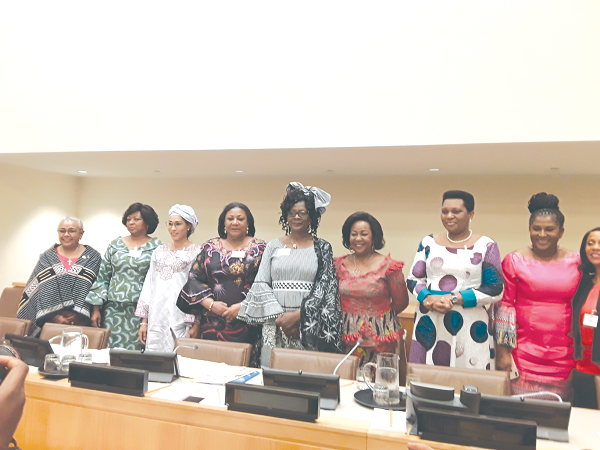
African first ladies discuss OAFLA’s strategic plan
First ladies from Africa have met in New York to discuss how to contribute to the health and well-being of children, the youth and women on the continent.
The first ladies who are members of the Organisation of African First Ladies Against AIDS (OAFLA) met on the sidelines of the 73rd United Nations General Assembly (UNGA) currently, underway at the UN Headquarters in New York.
The African First Ladies, including Ghana’s First Lady, Mrs Rebecca Akufo-Addo, met to discuss the 2019-2023 strategic plan of OAFLA.
Different suggestions
Though the organisation’s strategic plan has a list of about seven broad areas that members are expected to be committed to, most members who participated in discussions on the floor were divided as to whether to stick to just some core areas such as fighting HIV, cancer and child marriage.
The focus areas in the document include fighting HIV and AIDS, Non-communicable Diseases (NCDs), Reproductive, Maternal, New-born and Child Health (RMNCH), gender equality, women and youth empowerment, Universal Health Coverage (UHC), social security and strengthening institutional capacity.
Members were, however, of the view that the document should narrow its areas to at most four to make it easy for the members to successfully work towards the attainment of the goals.
With a vision of “a developed Africa with healthy and empowered children, youth and women”, the document has the goal of making a significant contribution to the health and well-being of children, youth and women in Africa.
Some OAFLA members present
Some of the first ladies present were from Ghana, Sierra Leone, Zimbabwe, Nigeria, Lesotho, Uganda, Madagascar, Congo, Burundi, Ethiopia and Burkina Faso.
The First Lady of Burkina Faso, Madam Sika Bella Kabore, who is the acting President of OAFLA, said the organisation would continue with such discussions to enable it to come out with a workable document which members could work with.
OAFLA will hold some meetings with development partners to enable them to work towards the attainment of their goals in their respective countries.
